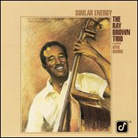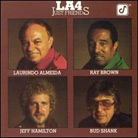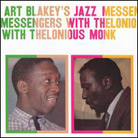![[SoundStage!]](../sslogo3.gif) The Vinyl Word The Vinyl WordBack Issue Article |
December 2003 Found on Vinyl: Ray Brown, L.A.4, and Art Blakey Here we are firmly in the age of SACD and DVD-A, and vinyl-reissue companies seem to be proliferating almost as quickly as speaker manufacturers. And the genres of music being reissued are expanding also. Today we have an abundance of pop/rock, blues, and world music LPs, as well as the continued assault on the jazz and classical fields that have, until now, been the staple of the reissue business. It’s becoming more and more evident that now may be the time to become a vinylphile. I recently came into possession of three newly pressed jazz releases from a trio of companies: Pure Audiophile Records' reissue of Ray Brown’s Soular Energy [Pure Audiophile PA-002 (2)], Groove Note’s reissue of L.A.4’s Just Friends [Groove Note GRV 1016-1] (both from the Concord vaults), and 4 Men With Beards reissue of Art Blakey’s Jazz Messengers with Thelonious Monk [4 Men With Beards 110] (originally issued on Atlantic Records). Each comes with a slightly different claim to fame. Soular Energy was a single 33 1/3-rpm record album now cut onto two LPs, Just Friends is a single record now turned into a double LP and cut at 45 rpm, and Blakey with Monk is an attempt to offer a 180-gram replica of the original at a price comparable to that of a regular CD. But of far greater importance to prospective purchasers is just how they stack up sonically. Concord Records seems to have become the modern-day version of Blue Note, a label with a vast treasure trove of wonderful jazz titles just awaiting primo vinyl reissue. And there are three gentlemen whose memory of just how rich and deep that collection is remains preternaturally high. Pure Audiophile Records' Dennis Cassidy and Groove Note Records' Ying Tan and Sebastian Koh have begun to mine that mother lode, with vinyl lovers being the beneficiaries.
Soular Energy was half-speed mastered by the legendary Stan Ricker (a pro-caliber bass player himself) and pressed at R.T.I. as a limited-edition HQ-180-gram colored (blue!) virgin-vinyl release. Quality oozes from this album almost as soon as you pick it up. The records themselves are flat, quiet and clean. They’re protected in real V.R.P. rice-paper inner sleeves, and there's quality cardboard for the jacket. Impressive. And by stretching the music out over two full LPs, Pure Audiophile has ensured two things of consequence for prospective purchasers. First, there will be absolutely no signal compression (each side is only about 15 minutes long), so everything, from the deepest bass notes to fingers on the keyboard to every splash of the cymbals, as captured via the master tapes, is there for your enjoyment (provided your vinyl playback system is up to the challenge). And second, they’ve included a trio of bonus tracks to fill out the set and round out your listening pleasure. As I noted, musically this album swings from start to finish. Brown’s bass is right there, in your room -- it's deep, tight, woody, resonant, you-pick-the-adjective real. This is bass reproduced in as authentic a manner as I’ve ever heard. Harris’ piano is spread out from just inside the left speaker to the outside edge of the right, a full-sized instrument with all the power and weight of the real thing. And King’s drums are set back, but not ignored. You can hear every rattle of the snares and all the shimmer and splash of his cymbals. These three musicians find the perfect groove and stay there, from opening to close. And don’t miss the cut on which the trio is joined by Red Holloway on tenor sax and Emily Reimer on guitar. What a superb change of pace. This is primo stuff -- a desert-island album if ever I heard it.
Just Friends is a laid-back, feel-good session recorded by four musicians who are in total musical sympathy with each other. But then, one should expect no less when bassist Ray Brown, alto saxophonist Bud Shank (both of whom spent much of their careers playing cool jazz on the West Coast), guitarist Laurindo Almedia (whose Latin style fits in perfectly here), and young-gun drummer Jeff Hamilton get together. Musically, picture the Modern Jazz Quartet with Almedia’s guitar in for John Lewis’ piano and Shank’s alto for Milt Jackson’s vibes. While it may make for a slightly different tonal balance, the style is much the same -- smooth, easy, professional jazz that swings like mad. Each instrument stands out in its own acoustic space as a real (well, as real as recorded sound can get) musical instrument being played by an honest-to-goodness musician. You won’t hear anything innovative or new on Just Friends; what you do get is four pros demonstrating how group improvisation is done. They find the groove and ride it, allowing the music to flow. This is lovely, relaxing music that’ll cleanse your soul after a long day's work.
Although this title was originally released in 1957 in mono, then later in stereo by Atlantic, 4 Men With Beards chose to reissue in stereo. Now, before you begin wondering about the reason, the idea has merit. While most (if not all) early stereo jazz releases were of the hard-left/hard-right soundstage variety, and in the case of this album you get Monk located in the left channel and Blakey and the Jazz Messengers in the right. But 4 Men With Beards has managed to lessen the effects of that left/right panning somewhat. Here you get more of a real meeting of Monk and Blakey. And besides, audiophiles seem to prefer stereo to mono, so 4 Men With Beards has decided to cater to their wishes. Their vinyl is manufactured by Rhino, and the packaging, while quite good, is not an exact replica of the original. But the 180-gram vinyl is clean, flat and quiet. That such an album can be produced for a reasonable price offers hope for vinyl lovers that future LPs will continue to be both readily available and reasonably priced. Performing an almost totally Monkian playlist, Blakey and his Jazz Messengers -- Johnny Griffith on tenor sax, Bill Hardman on trumpet and Spanky DeBrest on bass -- meet Monk and his music head on, and they don’t flinch. Blakey in particular seems to understand the intricacies of Monk’s music better than any other drummer the pianist ever played with. Here, Blakey is his normal powerful self, and he uses his drums to drive as well as prod Monk (and the remainder of the Messengers) into new and even more inventive improvisations. A mint original of this LP will put a real dent in your wallet (if you can find one, that is). I compared mine (I got lucky) with this reissue and found that while the original offers a bit more in the way of ambience, the reissue is crisper, with fully as much detail and far quieter surfaces. Also, if you want to hear just how propulsive a drummer Blakey was, this reissue will definitely do that for you. When he soloed, he exploded from my speakers. So there you have it, three distinct labels, each with its own priorities, but with one common denominator: They all love vinyl and want it to continue to be the carrier of high-resolution music. Pure Audiophile Records, Groove Note and 4 Men With Beards have created superb vinyl reissues of worthwhile jazz titles. They have done so by adhering to one simple credo: If you can’t do it better than the original, do it at least as well or not at all. To say that they’ve accomplished that goal would be needless rhetoric. As this trio of records ably demonstrates, vinyl continues to be a viable music-carrying medium, one that audiophiles should pass over at their peril. ...John Crossett
|
|
![[SoundStage!]](../sslogo3.gif) All Contents All ContentsCopyright © 2003 SoundStage! All Rights Reserved |
 I began my listening with Soular Energy. This
album merges two almost disparate audiophile ideals -- superb music and top-notch sound. Soular
Energy has always been a favorite of the audiophile community, but its recent
re-emergence in all the new high-rez formats, and especially this set as done by Pure
Audiophile Records, should cause audiophiles everywhere to start dancing in the streets.
This may be the record to own if you’re not sure you like jazz or want to
introduce the genre to others. Between Brown’s masterful bass work, Gene Harris’
(of The Three Sounds fame) funky, soulful, bluesy piano, and the subtle beat provided by
drummer Gerryck King, this album sings and swings like mad. It’ll have you listening
again and again and again. I know it’s not strayed far from my turntable since its
arrival.
I began my listening with Soular Energy. This
album merges two almost disparate audiophile ideals -- superb music and top-notch sound. Soular
Energy has always been a favorite of the audiophile community, but its recent
re-emergence in all the new high-rez formats, and especially this set as done by Pure
Audiophile Records, should cause audiophiles everywhere to start dancing in the streets.
This may be the record to own if you’re not sure you like jazz or want to
introduce the genre to others. Between Brown’s masterful bass work, Gene Harris’
(of The Three Sounds fame) funky, soulful, bluesy piano, and the subtle beat provided by
drummer Gerryck King, this album sings and swings like mad. It’ll have you listening
again and again and again. I know it’s not strayed far from my turntable since its
arrival. Next, I dropped
Groove Note’s initial Concord Records vinyl release of the L.A.4’s Just
Friends onto the spindle. Cut at 45 rpm and pressed on two double-sided 180-gram vinyl
biscuits, Just Friends continues Groove Note’s tradition of flat, dead-quiet
pressings. Packaging, too, is first-rate, from the nice cardboard cover stock to the
album’s rice-paper liner sleeves right on down to the classy replica of Concord's
center label. But it was the sonics that knocked me out. As I’ve noted in the past,
the difference between 33 1/3 and 45 rpm is about as great as that between good
Redbook CD and SACD. There’s just more information there. The sense of the four
musicians standing in front of you is so palpably real that it will come as something of a
shock to anyone who has not heard the difference before. About the only negative a 45 rpm
record has, especially for the more digitally inclined music enthusiasts among us, is
having to get up more often to turn the record over. Just consider it your daily dose of
exercise. Because once you’ve driven at 45, you may never want to slow back down to
33 1/3 again.
Next, I dropped
Groove Note’s initial Concord Records vinyl release of the L.A.4’s Just
Friends onto the spindle. Cut at 45 rpm and pressed on two double-sided 180-gram vinyl
biscuits, Just Friends continues Groove Note’s tradition of flat, dead-quiet
pressings. Packaging, too, is first-rate, from the nice cardboard cover stock to the
album’s rice-paper liner sleeves right on down to the classy replica of Concord's
center label. But it was the sonics that knocked me out. As I’ve noted in the past,
the difference between 33 1/3 and 45 rpm is about as great as that between good
Redbook CD and SACD. There’s just more information there. The sense of the four
musicians standing in front of you is so palpably real that it will come as something of a
shock to anyone who has not heard the difference before. About the only negative a 45 rpm
record has, especially for the more digitally inclined music enthusiasts among us, is
having to get up more often to turn the record over. Just consider it your daily dose of
exercise. Because once you’ve driven at 45, you may never want to slow back down to
33 1/3 again. 4 Men With Beards has chosen a different route.
They’ve tapped into the vast Atlantic Records label for this entry in the
jazz-reissue derby. And the title they chose, Art Blakey’s Jazz Messengers with
Thelonious Monk, is an inspired one. Monk and Blakey were (and are, for that matter)
two big-name, big-time jazz musicians who understood one another and played well together.
The pairing, by Atlantic head Nesuhi Ertegun, clicked, and upon listening, it boggles the
mind that Monk and Blakey spent so little time working, or at least recording, in tandem.
4 Men With Beards has chosen a different route.
They’ve tapped into the vast Atlantic Records label for this entry in the
jazz-reissue derby. And the title they chose, Art Blakey’s Jazz Messengers with
Thelonious Monk, is an inspired one. Monk and Blakey were (and are, for that matter)
two big-name, big-time jazz musicians who understood one another and played well together.
The pairing, by Atlantic head Nesuhi Ertegun, clicked, and upon listening, it boggles the
mind that Monk and Blakey spent so little time working, or at least recording, in tandem.